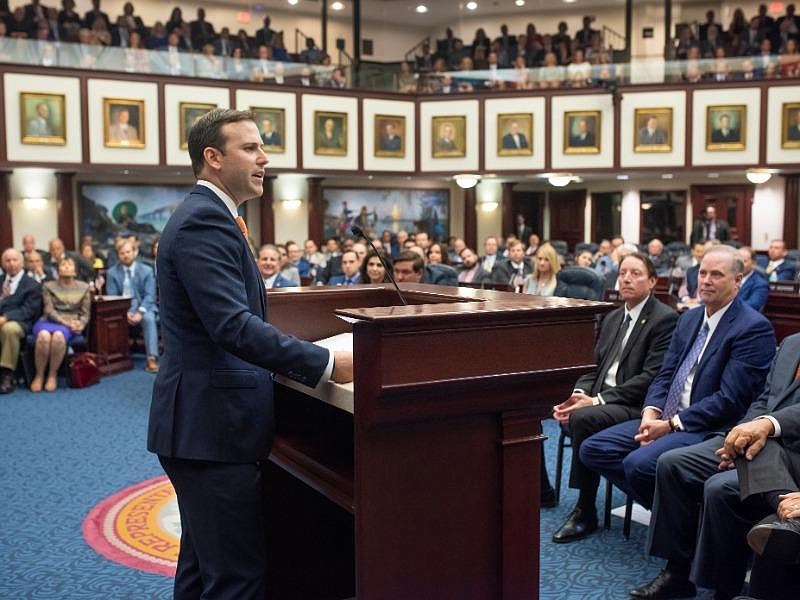- January 17, 2025
-
-
Loading

Loading

by: Christine Sexton
News Service of Florida
Florida House Speaker Chris Sprowls on March 23 threw his support behind a proposal to allow women to maintain Medicaid benefits for a year after they have babies — a bit of turnabout for the Republican-controlled Legislature.
Sprowls, flanked by a bipartisan group of lawmakers, was careful not to use the word “expansion” while discussing the Medicaid plan. But he said he wants the House to spend an additional $98 million in state funds to draw down additional matching federal dollars. In all, the plan would provide $244 million for benefits, which also include mental health counseling. Under current law, many women lose their benefits 60 days after having children.
“I believe that every baby should have the opportunity to be born healthy,” said Sprowls, R-Palm Harbor. “And for that baby to thrive, every mother needs appropriate care.”
The concept, at least initially, could cause a rift between the House and Senate since a top Senate Republican said his chamber is planning to release an austere health-care budget proposal that calls for cutting Medicaid.
“I know that it’s very important to the speaker, so we’ll see what we can do. It’s just that the cards I have wouldn’t allow me to do that right now,” said Sen. Aaron Bean, a Fernandina Beach Republican who chairs the panel that handles health-care spending in the Senate.
The House is expected to release full details of its proposed spending plans on Thursday, and Bean said he will take a closer look to see where the House would get the funding.
“It will be interesting for me to see how the House is doing it. How do they get there? That’s a lot of money,” Bean said. “It’s a lot of money to get there. But it’s a noble cause.”
As a recognition that healthy women deliver healthy babies, the Florida Legislature agreed nearly 30 years ago to allow pregnant women in Florida who earn 185 percent or below of the poverty level to enroll in the Medicaid program. But those benefits expire within 60 days after delivery for women toward the higher end of the income range. Sprowls wants those women to maintain their eligibility for another 10 months
The state estimates that nearly 98,000 women would be affected by the change if approved.
Sprowls said the House will release a budget “conforming bill” that would make the change permanent. Conforming bills accompany the budget and are vehicles used to make changes to substantive law to reflect spending policies.
“This is not a one-time, one-year commitment. If we’re going to be truly committed to mothers and the health of their children in the long term, it needs to be signaled in both word and deed that this is a long term commitment, and that’s what we’re going to do in the Medicaid conforming bill,” Sprowls said.
Sprowls also credited Rep. Kamia Brown, an Ocoee Democrat who sponsored a separate bill on the issue and joined him at the news conference Tuesday. A teary-eyed Brown said she hoped “today’s strong step forward from the House is one of many steps to the opportunity for all mamas to live and be mamas.”
Sprowls said he had not spoken with Gov. Ron DeSantis or Senate President Wilton Simpson, R-Trilby, about his proposal. Moreover, Sprowls downplayed a reporter’s question about past squabbles between the chambers and the governor’s office over expanding Medicaid coverage, including a 2015 dispute that forced lawmakers into a special session to pass a budget.
“Reasonable people can disagree. What this is about today is what we agree on. And no matter where you go in this state, no matter what organization you are or what school or what community center, when you ask people who are our most vulnerable population, the common themes that everyone --- -without exception --- will mention are new moms and their babies,” Sprowls said.
He added that while not everyone in the House agrees on a Medicaid expansion to provide coverage to uninsured childless adults, there is support to extend benefits for pregnant women.
“And that's why we have been so committed unabashedly to tackle this issue this session, and that's what we intend to do,” said Sprowls, who along with other speakers, called the proposal a Medicaid “extension”
Joan Alker, executive director of the Georgetown University Center for Covering Children and Families ,said the announcement from the House underscores the changing times.
“I think this speaks to that, as a country, we are in a changing moment. Proponents of keeping people uninsured cannot hold out forever,” she told The News Service of Florida. “The state could cover all women of reproductive age through Medicaid expansion and get lots more federal match, but short of expansion this is a significant step and an important contribution to reducing the extremely high and unacceptable rates of maternal mortality. “